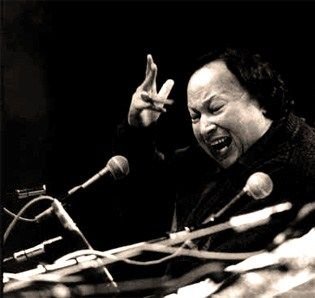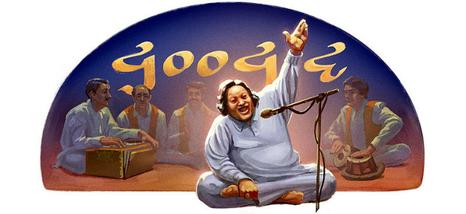Nusrat Fateh Ali Khan (Urdu/Punjabi: نصرت فتح علی خان; 13 October 1948 – 16 August 1997), was a Pakistani musician, primarily a singer of Qawwali, the devotional music of the Sufis.[1] He possessed an extraordinary range of vocal abilities and could perform at a high level of intensity for several hours.[2][3][4][5] Extending the 600-year old Qawwali tradition of his family, Khan is widely credited with introducing Qawwali music to international audiences.[6] He is popularly known as "Shahenshah-e-Qawwali", meaning "The King of Qawwali".[7]
Born in Faisalabad, Khan had his first public performance at the age of 16, at his father's chelum. He became the head of the family qawwali party in 1971. He was signed by Oriental Star Agencies, Birmingham, England, in the early 1980s. Khan went on to release movie scores and albums in Europe, India, Japan, Pakistan and the US. He engaged in collaborations and experiments with Western artists, becoming a well-known world music artist. He toured extensively, performing in over 40 countries.[8]
Background information
Native name نصرت فتح علی خان
Birth name Parvez Fateh Ali Khan
Also known as Shahenshah-e-Qawwali
Born 13 October 1948
Faisalabad, Punjab, Pakistan
Died 16 August 1997 (aged 48)
London, England, UK
Genres
Qawwali ghazal classical folk world
Occupation(s)
Qawwal musician singer music composer world
Instruments
Vocals harmonium tabla
Years active 1965–1997
Labels
Real World OSA EMI Virgin Records
Early life and career
Khan was born in a Punjabi Muslim family in Faisalabad in 1948, shortly after the partition of India in 1947 during which his family had migrated to Pakistan from their native city of Jalandhar in East Punjab, British India (now in Punjab, India).He originates from Basti Sheikh in Jalandhar. His ancestors learnt music and singing there and adopted it as a profession. He was the fifth child and first son of Fateh Ali Khan, a musicologist, vocalist, instrumentalist, and qawwal. Khan's family, which included four older sisters and a younger brother, Farrukh Fateh Ali Khan, grew up in central Faisalabad. The tradition of qawwali in the family had passed down through successive generations for almost 600 years.[9] Initially, his father did not want Khan to follow the family's vocation. He had his heart set on Nusrat choosing a much more respectable career path and becoming a doctor or engineer, because he felt Qawwali artists had low social status. However, Khan showed such an aptitude for and interest in Qawwali, that his father finally relented.[10] He began by learning the tabla before moving on to vocals.[citation needed] In 1964, Khan's father died, leaving his musical education under the supervision of his paternal uncles, Mubarak Ali Khan and Salamat Ali Khan.[citation needed] He is the uncle of singer Rahat Fateh Ali Khan.
In 1971, after the death of his uncle Mubarak Ali Khan, Khan became the official leader of the family Qawwali party and the party became known as Nusrat Fateh Ali Khan, Mujahid Mubarak Ali Khan & Party. Khan's first public performance as the leader of the Qawwali party was at a studio recording broadcast as part of an annual music festival organised by Radio Pakistan, known as Jashn-e-Baharan. Khan sang mainly in Urdu and Punjabi and occasionally in Persian, Braj Bhasha and Hindi. His first major hit in Pakistan was the song Haq Ali Ali, which was performed in a traditional style and with traditional instrumentation. The song featured restrained use of Khan's sargam improvisations.
Death
After traveling to London from his native Pakistan for treatment for liver and kidney problems, Khan was rushed from the airport to Cromwell Hospital.
London's Daily Telegraph reported that doctors at the hospital attributed Khan's death to his treatment in Pakistan with infected dialysis equipment, from which they said he contracted hepatitis. The singer, who various reports said weighed over 300 pounds, had been seriously ill for several months, according to a spokesperson at his U.S. label, American Recordings.[18]
He died of a sudden cardiac arrest at Cromwell Hospital, London on 16 August 1997, aged 48.[19] His body was repatriated to Faisalabad, and his funeral was a public affair. He was buried in Kabootran Wala Qabristan also known as Jhang Road Graveyard on Jhang Road, Faisalabad.Map
His wife, Naheed Nusrat, died on 13 September 2013 in Credit Valley Hospital in Mississauga, Ontario, Canada. Naheed had moved to Canada after the death of her husband. She is survived by their daughter Nida Khan.[20][21] Khan's musical legacy is now carried forward by his nephew, Rahat Fateh Ali Khan.[22]
Awards and titles
Khan is widely considered to be the most important qawwal in history.[23][24] In 1987, he received the President of Pakistan's Award for Pride of Performance for his contribution to Pakistani music.[14][25] In 1995, he received the UNESCO Music Prize.[26][27] In 1996 he was awarded Grand Prix des Amériques at Montreal World Film Festival for exceptional contribution to the art of cinema.[28] In the same year, Khan received the Arts and Culture Prize of the Fukuoka Asian Culture Prizes.[29] In Japan, he was also remembered as the Budai or "Singing Buddha".[30] In 2005, Khan received the "Legends" award at the UK Asian Music Awards.[31] Time magazine's issue of 6 November 2006, "60 Years of Asian Heroes", lists him as one of the top 12 artists and thinkers in the last 60 years.[32] He also appeared on NPR's 50 great voices list in 2010.[33] In August 2010 he was included in CNN's list of the twenty most iconic musicians from the past fifty years.[34] In 2008, Khan was listed in 14th position in UGO's list of the best singers of all time.[35]
Many honorary titles were bestowed upon Khan during his 25-year music career. He was given the title of [[Ustad] (the master)] after performing classical music at a function in Lahore on his father's death anniversary.
Congratulations @shahzaibrock! You have received a personal award!
Click on the badge to view your Board of Honor.
Downvoting a post can decrease pending rewards and make it less visible. Common reasons:
Submit
Congratulations @shahzaibrock! You received a personal award!
You can view your badges on your Steem Board and compare to others on the Steem Ranking
Do not miss the last post from @steemitboard:
Vote for @Steemitboard as a witness to get one more award and increased upvotes!
Downvoting a post can decrease pending rewards and make it less visible. Common reasons:
Submit